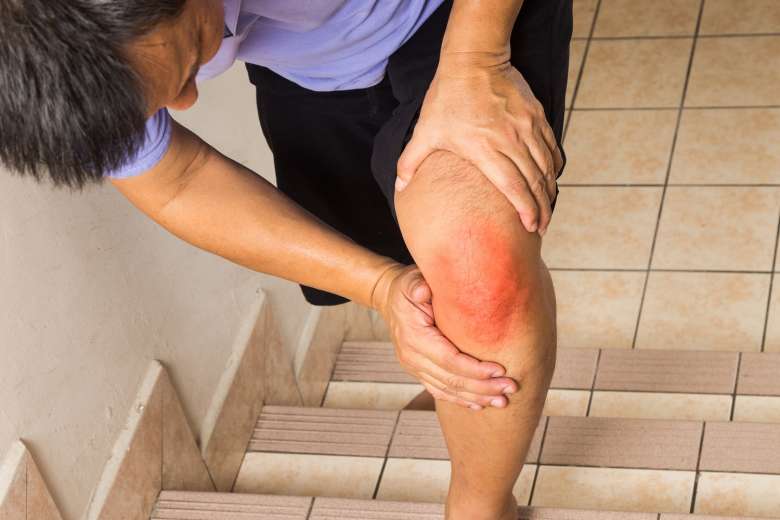First US Study Shows Positive Results Of Using Genicular Artery Embolization (GAE) For Treatment Of Knee Pain Caused By Osteoarthritis
Source: Thailand Medical News Dec 18, 2019 6 years, 2 months, 4 days, 17 hours, 23 minutes ago
A recent study published in
Journal of Vascular and Interventional Radiology details the first study of its kind in the U.S. to examine the use of
genicular artery embolization (
GAE) for extended treatment of
knee pain caused by
osteoarthritis (OA). Principal investigator of the study, Dr Ari Isaacson, MD, clinical associate professor of vascular and interventional radiology in the University Of North Carolina School of Medicine, says the results are positive.

Dr Isaacson told
Thailand Medical News "In this study we showed that genicular artery embolization (
GAE) can be performed safely and that it demonstrates potential efficacy."
An estimated 360 million individuals globally have
knee pain as a result of
osteoarthritis. Current treatments for the
knee pain include steroid injections, pain medications and physical therapy. Injections sometimes do not work, and when they do, tend to last only several months, at most. Pain medications are needed daily and can lead to dependence on opioids and toxicity from nonsteroidal anti-inflammatory drugs (NSAIDs, such as ibuprofen). Physical therapy can be taxing and painful. Total
knee replacements are an option as well, but because they have a limited lifetime of 15-20 years, they are not performed until a patient reaches an optimal age.
Genicular artery embolization or
GAE is a minimally invasive procedure that blocks blood flow to certain parts of the
knee that can be the source of
osteoarthritis-related pain. More than 80 percent of patients with chronic
OA also have chronic inflammation, which leads to synovial angiogenesis ie the formation of new arteries in the portion of the
knee called the synovium. Blood flow to the new arteries can irritate nerves in the synovium, causing pain. Therefore, blocking blood flow to these arteries relieves that irritation and reduces pain. Past studies from researchers in Japan and Korea have shown the procedure has the potential to provide pain relief for up to a year or more.
Typically, during the procedure, interventional radiologists block blood flow by inserting a spaghetti-sized catheter into the arteries through a very small incision. The catheter is then directed through the arteries to the knee using X-ray and iodinated contrast. Once the appropriate
knee arteries are identified, spherical particles are injected to create a blockage. Because the catheter is used to select only the tiny abnormal arteries, the majority of the blood flow to the knee is preserved. Patients were under moderate sedation during the short procedure and were discharged the same day. No physical therapy was required and patients felt relief from their
knee pain within three days.

quot;https://www.thailandmedical.news/uploads/editor/files/Genicular Artery Embolization.jpg" style="height:254px; width:375px" />
The recent two-site trial, funded by Boston Scientific, included 20 patients,9 men and 11 women aged 49 to 84 with moderate to severe
knee pain from
osteoarthritis. After the procedure all patients had follow-up visits at one, three, and six months. The decrease in pain reported by participants was significant, so much so that the improvement scores surpassed researchers' benchmark goal for proving efficacy of the procedure. Nearly all patients still had an improvement in pain after one month. Around 80 percent of patients still had less pain after six months. In addition to less reported
knee pain, 65 percent of participants reported a decrease in use of daily pain relief medication.
Dr Isaacson added, "We've seen that most patients experience a rapid decrease in pain and disability after
GAE for
osteoarthritis-related
knee pain. This procedure has promise to be a replacement for injections and the daily use of pain medications, but more research is needed."
Dr Isaacson and fellow researchers are in the process of conducting a randomized control trial, funded by a grant from Medtronic, comparing
GAE to a sham procedure in order to determine how much of the improvement observed in these patients may be attributed to placebo. The procedure is currently only available in clinical trials.
Reference : Sandeep Bagla et al. Genicular Artery Embolization for the Treatment of Knee Pain Secondary to Osteoarthritis, Journal of Vascular and Interventional Radiology (2019). DOI: 10.1016/j.jvir.2019.09.018
